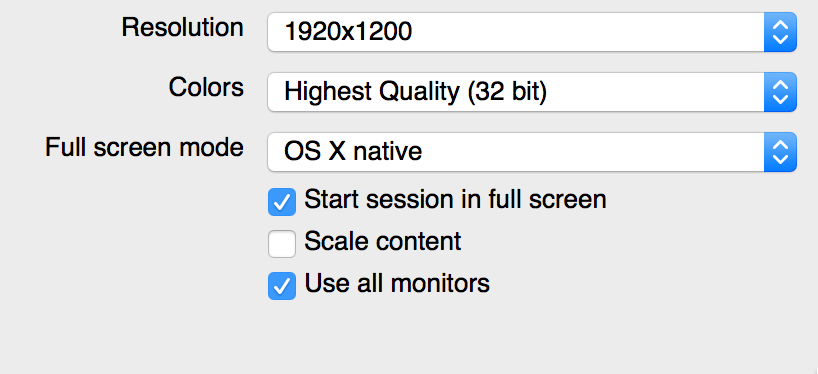Mac Microsoft Remote Desktop Configuration
- Mac Microsoft Remote Desktop Configuration Windows 10
- Mac Os Microsoft Remote Desktop Configuration File
- Mac Microsoft Remote Desktop Configuration Download
- Microsoft Remote Desktop For Mac
Feb 13, 2020 Microsoft Remote Desktop for Mac is an application that allows connecting to virtual apps or another PC remotely. Discover the power of Windows with Remote Desktop designed to help you manage your work from any location over a network connection. Jun 02, 2019 Make sure Remote Desktop is able to communicate through your firewall. Find the IP address of the computer on your home network that you want to connect to. Open your router's configuration screen and forward TCP port 3389 to the destination computer's IP address. Find your router's public IP address so that Remote Desktop can find it on the. Remote Desktop clients.; 2 minutes to read +5; In this article. Applies to: Windows 10, Windows 8.1, Windows Server 2019, Windows Server 2016, Windows Server 2012 R2. You can use a Microsoft Remote Desktop client to connect to a remote PC and your work resources from almost anywhere using just about any device. Mar 20, 2019 In Remote Desktop Connection, type the name of the PC you want to connect to (from Step 1), and then select Connect. On your Windows, Android, or iOS device: Open the Remote Desktop app (available for free from Microsoft Store, Google Play, and the Mac App Store), and add the name of the PC that you want to connect to (from Step 1). Get the Remote Desktop client. Follow these steps to get started with Remote Desktop on your Mac: Download the Microsoft Remote Desktop client from the Mac App Store. Set up your PC to accept remote connections. (If you skip this step, you can't connect to your PC.) Add a Remote Desktop connection or a remote resource. Download Microsoft Remote Desktop for Mac. Connect to Windows-based PCs to access Windows-based files, applications, devices, and networks from your Mac.
Latest microsoft autoupdate mac. The following page(s) contain instructions on using Remote Desktop to connect to Faculty & Staff Windows computers on the UMKC campus (from off-campus). Your campus computer must be powered on to receive connections.
Don't know your computer name or don't know if your account has the correct permissions? Find out here. If you need assistance, please contact the IS Technology Support Center or your IT Liaison.
Mac Microsoft Remote Desktop Configuration Windows 10
Please note: Before you attempt to connect to UMKC resources remotely, please make sure your operating system (Apple OS X) has all applicable security updates installed.
To connect to your campus Windows PC from a Mac you will need to use the Microsoft Remote Desktop application for Mac version 10.3.8 (or higher). If you are using a university-owned Mac, you may already have this app installed. Please contact the Technology Support Center or your IT Liaison if you have questions about using this software on a university-owned Mac.
Mac Os Microsoft Remote Desktop Configuration File
| Supported | Default Icon | Client Name |
| Microsoft RDP v10 Link to Download | ||
| Microsoft RDP v8 | ||
| Apple RDC |

Mac OS X Remote Desktop Connection Instructions
Mac Microsoft Remote Desktop Configuration Download
- Open the Microsoft Remote Desktop application
- Click the '+' icon
- Select PC
- For PC Name, enter the name of the remote computer to connect to. Or check How to find my computer name
- For User Account, click the dropdown to change the setting
- Click Add User Account
- For User Name, type UMKCusername@umsystem.edu in DomainUsername
- For Password, type your UMKC Username Password. Note: you will need to update your Remote Desktop settings every time you change your UMKC Username password.
- Click Save
- For Friendly Name, enter the PC name
- Click on no gateway to change the setting
- Select Add Gateway from the dropdown
- For Server Name, enter tsg.umkc.edu
- For User Account, click Use PC User account
- Select your UMKC username from the list
- Click Add
- Click Add again
- To initiate the connection, double click on your PC Name tile
- Click Show Certificate
- Click Always Trust to prevent seeing this warning again for the PC specified
- Click Continue